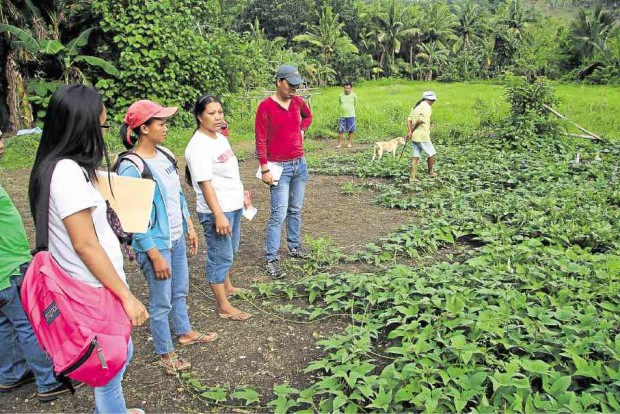Farmers learn to cope with climate change

Women in Ivisan, Capiz, discuss the attributes of sweet potato or camote that they are testing for the first time. These women live along the coast and have to contend with typhoons that regularly destroy crops. —CONTRIBUTED PHOTO
Donald Trump may believe climate change is a hoax devised by nations hostile to the United States, but for farmers Glora Macaraig and Juanito Tique of Quezon province and Ruperto Catubuan of Capiz, it is real even if they did not know the term until recently.
Macaraig, Tique and Catubuan—farmers all their lives—saw and felt how extreme and unpredictable weather conditions were affecting their means of livelihood.
Tique said their cropping schedule used to be so routine. Every year, planting and harvesting were done in the same months.
But now, they had to monitor the weather carefully before planting. “Last year, we had the drought. This year, we’re getting a lot of rain,” he said.
“We should have been able to plant in October,” Macaraig said. “But the weather is so unpredictable. There’s so much rain and the water stays for a while. We had to plant between November and December.”
Article continues after this advertisementCatubuan noted that Capiz and other parts of western Visayas were traditionally not on the path of typhoons. But in recent years, several strong tropical storms had devastated the region.
Article continues after this advertisementMacaraig said there were more destructive insects to contend with.
It was not until agricultural scientists and experts from the University of the Philippines Los Baños (UPLB) and other schools, the International Institute for Rural Development (IIRR) and other institutions, government agriculturists and nongovernment organizations explained what was going on that Tique, Macaraig, Catubuan and other farmers finally learned the term used to describe the weather instability that had upset their routines.
Tique, Macaraig and Catubuan were among the participants in the recent Community-based Adaptation and Mitigation for Food and Livelihood Security: Learning and Sharing Event hosted by IIRR at its headquarters in Silang, Cavite.
Participants, which included farmers, academics, government experts and NGO representatives, acknowledged that climate change “is a reality that we cannot deny or ignore and we need to face it.”
IIRR’s Julian Gonsalves said, “Agriculture has to change to [adapt] to climate change.”
He said that in recent years, the challenge for small farmers to grow food has been substantially complicated by climate change [which] farmers often refer to … as either ‘too much water—often at the wrong time, or too little water.’”
“The Philippines is primarily reliant on small farms for its food security,” Gonsalves said, stressing the urgency of helping farmers cope with climate change.
But small farmers, especially tenant farmers, were among the poorest in rural areas.
The IIRR forum stressed the need to find immediate solutions to climate change problems and to work with farmers in their implementation.
Scientists and experts said many technologies were already available. Government policies to cope with climate change had been adopted and different organizations and institutions had developed various interventions, although access was still limited.
The forum said that to facilitate community-based adaptations (CBA), local solutions had to be found by working with farmers.
Gonsalves said CBA approaches required that services be provided locally, including financial and extension services. IIRR, he said, had modeled the concept of farmer champions who served as local resource persons in their communities, providing on-site support and guidance.
In two areas where IIRR was active—Ivisan, Capiz and Guinayangan, Quezon—farmers had already started changing their farming routines and technologies, with support from the Department of Agriculture Systems Wide Climate Change Office (DA-SWACCO) and Bureau of Agriculture, using research provided to IIRR and its municipal level project partners.
“In a short span of one to two years, local communities have developed and tested scalable models that local governments can draw on and replicate. Using a no-regrets approach (approaches that work even if the expected climate change risk does not present itself), farmers are achieving 20-40 percent increased yields … using improved locally-adapted crop varieties and improved resource management and social processes,” Gonsalves said.
From IIRR’s experience, he said “it does not take long to bring about change where it is needed the most at the community levels. The solutions are there and the science/research community in the Philippines has been working diligently to develop climate smart varieties [that tolerate salinity, drought and floods].”
He said farmers, for instance, were trying alternative crops to grow after upland rice or corn, taking advantage of the moisture in the soils.
“Currently over 60 farmers in two sites are growing peanuts, a new and promising crop following upland rice or corn. Peanuts are also grown as intercrop with cassava to reduce soil,” Gonsalves said.
Farmers saved the seeds of those varieties that performed well, he said. Community seed banks had been started.
Gonsalves said farmers were also trying sweet potato, a multipurpose, resilient and nutritious crop. Prices were good and rising as consumers had discovered the nutritional and health value of sweet potato.
Other farmers had gone into small livestock to augment income from farming.